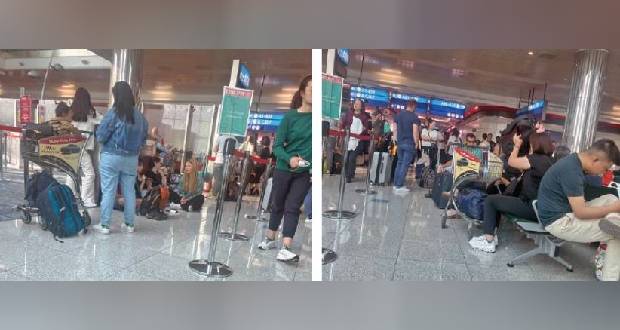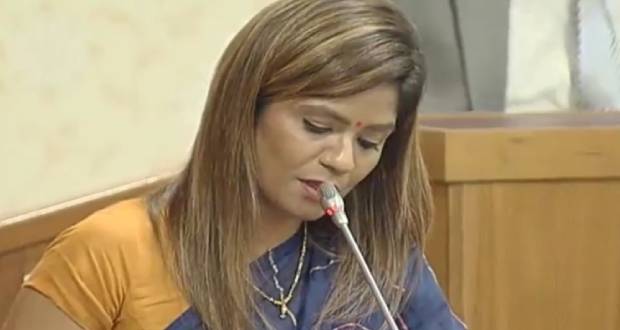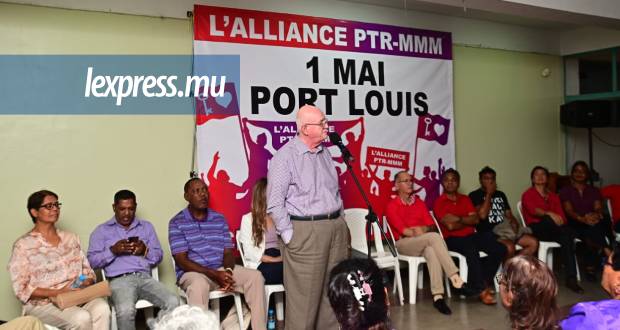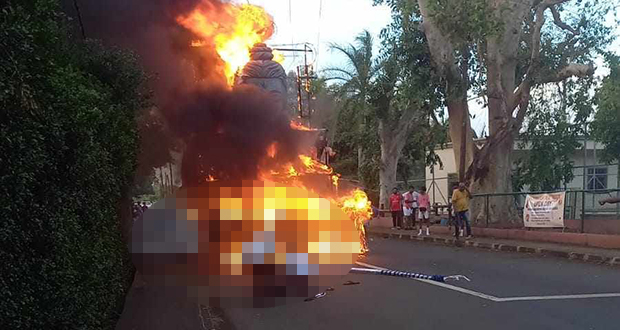Publicité
SECOND READING THE CONSTITUTION (DECLARATION OF COMMUNITY) (TEMPORARY PROVISIONS) BILL (No. V of 2014) AT THE SITTING OF THE NATIONAL ASSEMBLY FRIDAY 04 JULY 2014
1 juillet 2014, 20:57
Par
Partager cet article
SECOND READING THE CONSTITUTION (DECLARATION OF COMMUNITY) (TEMPORARY PROVISIONS) BILL (No. V of 2014) AT THE SITTING OF THE NATIONAL ASSEMBLY FRIDAY 04 JULY 2014

Mr Speaker, Sir,
It is with a sense of pride and satisfaction that I rise to introduce this Bill of historical significance in this august assembly this afternoon.
For this Bill ushers in a new dawn in our political history and the electoral landscape of our country.
This Bill, Mr Speaker, Sir, is the first step along a highway that started 46 years ago when we obtained our independence and freedom.
What we are starting today, is the process of removing the consecration of Communalism from explicit enshrinement in our Constitution.
It is the first step towards achieving the hopes and aspirations of many of us who believe in the oneness of humanity.
For this Bill, Mr Speaker, Sir, is the beginning of the end of institutional Communalism in the highest law of our land.
Mr Speaker, Sir,
The Constitution and the electoral system we inherited at independence, after protracted and heated discussions between our leaders and the colonial power of the day has undoubtedly served us well.
However, 46 years after we achieved our freedom, much change has taken place.
Our Constitution and electoral system need to evolve and reflect these changes.
Mr Speaker, Sir,
I have been saying for many years now, that I strongly believe, that after more than four decades since our independence, it is time that we remove even the shadow of Communalism from the highest law of our land.
The Bill we are to debate today is the first step towards the achievement of this noble goal.
It is the first step towards consolidating and strengthening our national identity and towards nation building. The final step will be the full electoral reform which I hope will be enacted by the next Parliament which will dispense altogether with the need for a candidate to declare his or her community to stand as a candidate at a general election.
It will also subsume the current Best Loser System by changing its mechanism while maintaining its objective of broad socio–demographic representation of all the components of our rainbow nation in the National Assembly.
This, Mr Speaker, Sir, is the ineluctable process of historical development in which our nation is irreversibly engaged.
Mr Speaker, Sir,
Since the Bill has been circulated, some have said, as I am sure, some Hon Members opposite will repeat, ad nauseam, that it is only a mini-amendment, small in scope; and why should it have taken weeks to prepare?
Let me therefore tell them: they are utterly misguided.
In its significance, in its place in our Constitutional history, it is momentous.
This Bill will, for the first time, since independence, abolish the legal requirement upon a candidate at the next general election, to declare his or her community as a condition of eligibility to stand for election to this House.
This is a major change.
Mr Speaker, Sir,
To understand, why it is such a momentous change, we need to go back to how our Constitution was so framed and the background to it.
As I said, earlier, there was bitter division between the different parties at the time, with the consequence that the country was divided.
The Labour Party had for a long time been demanding our independence. It was later on joined by the CAM and the IFB.
But the Parti Mauricien – later renamed the PMSD – was totally opposed to Independence. Communal fears were whipped up; People were being told that the minorities were at risk of being excluded.
The then Secretary of State for the colonies appointed a Constitutional Commissioner, Professor Stanley de Smith to advise him.
Because of the divisive political and social environment, prevailing at the time, a system was devised to allocate additional seats on Communal lines.
That system, the Best Loser System, necessitated that each candidate should declare to which of four constitutionally defined communities he or she belonged.
But Professor de Smith, himself, was opposed to the proposal. He said “My own belief is that the immediate effect of the introduction of communal representation in any form would be to intensify communalism by endowing it with the accolade of legitimacy, that candidates in an electoral campaign would experience irresistible temptations to appeal to the narrower communal prejudices, that there would be increasing demands for communal representation in other walks of private life, and that the long-term effects would be deleterious both to the minorities which now think of it as a safeguard and to the general welfare of the island”.
Professor de Smith could not have been more prophetic.
Because this is exactly what happened.
Communalism has become entrenched in the way of thinking of many – even today !
Professor de Smith went on to call it a “distasteful procedure”.
And even then, he said “I imagine that it would be difficult to agree upon the constitutional definitions of a Hindu and a member of the General population”.
When it became apparent, that there could not be agreement between the political leaders, he conceded that given “the social and political climate in Mauritius – it may be regarded as the least of evils but an evil nevertheless, and one which may seriously inhibit the growth of national consciousness over the years”.
Prof de Smith was a Constitutional expert who rightly foresaw that we were planting the seeds of communalism and division at the very birth of our nation.
Mr Speaker, Sir,
The misgivings against the BLS as it is now, still remains unrefuted by time and progress.
It is unquestionably true that our Constitution is one of the very few remaining in the world that divides its people by ethnicity – and worse – it is the only one that does so by means of approximation.
For it is clear that the four constitutional communities do not accurately reflect the true ethnic roots or identities of our component traditions. They are over-inclusive approximations - artificial legal constructs - that in themselves give rise to serious problems of interpretation and disenfranchisement.
These difficulties have now been joined by a new, but even more powerful objection. In 1982, the Government of which the Honourable Leader of the Opposition was a leading member, decided to do away with the mandatory collection of data about a citizen's community in the census, which is carried out every 10 years.
That was a far sighted decision.
However, it has transpired that, ever since then, the Best Loser System has been living on borrowed time because it must refer to the last census in which such information was gathered so that the relevant proportions of each community can be reliably calculated for the purpose of allocating the additional seats.
As time has elapsed, a system that depends on statistics gathered over forty years ago has become impossible to justify. Either the census must resume the compulsory collection of this data or - the Best Loser System must change.
Mr Speaker, Sir,
It did not take the decision of the United Nations Human Rights Committee to tell us this inescapable fact - that sooner or later, the nettle must be grasped. But we must recognize the fact that the group “Rezistans Ek Alternativ” have had the courage to persist through the Courts and the United Nations Human Rights Committee to force the issue to an earlier conclusion. They ought to be congratulated. The Human Rights Committee has no doubt acted as a spur to our domestic debate; however, I believe that the growing consensus for electoral and constitutional change is responding to a much more profound aspiration that is moving our nation towards modernity.
It may now only be the faintest of breezes barely disturbing the sails of the ship of State. But a prudent captain of a ship makes changes before the breeze becomes a gale.
Mr Speaker, Sir,
It is noteworthy that the eminent Judge of the South African Constitutional Court together with the two equally eminent members of the Sachs Commission – Mr Tandon, a former electoral Commissioner of India and our own former Supreme Court Judge, Justice Ahnee, repeated Prof de Smith’s warning on the BLS in their report in 2002, that is 37 years later.
The Sachs Commission described the BLS as “a unique and novel electoral device that increasingly divided Mauritius and baffled visitors to the country. Such comfort as it offers comes at the price of it appearing as odd and anachronistic to the very security it was designed to offer.
It carries with it the real danger of marginalizing from the rest of society those identified with it so that what started off as intended to be a protection could end up becoming an impediment”.
They suggested that we should “find ways and means of assimilating the BLS into the new dispensation without prejudicing the status of the community or communities concerned and without keeping alive features which are widely considered to be anachronistic and offensive".
For those who are still oblivious to this stark reality, and who still think in terms of community, let me remind them that our own Courts have also reminded us in clear terms that we must act. Let me just quote what Supreme Court Judge Seetulsing had to say in “Carrimkhan v Lewchin & others” in 2000:
“The problems of dividing the population according to the four categories are highlighted where the Supreme Court states, Way of life may depend on a series of factors - the way one dresses, the food one eats, the religion one practises, the music one listens to, the films one watches. External appearance and the name one bears are also pointers as to the community to which one may belong. The expression "way of life" used in the First Schedule has never been put to the test and some 33 years after the Constitution was drafted one cannot escape the fact that a common way of Mauritian life has gradually and steadily developed in Mauritius which cuts across communal barriers. This makes it still more difficult for a judge of the Supreme Court, whose decision is not subject to appeal, to determine whether somebody belongs to a particular community by looking at his way of life. The issue further arises as to how the judge can determine the way of life of a citizen unless he becomes like Big Brother in G. Orwell's novel 1984 and watches how a citizen leads his private life. One may also change one's way of life from one election to the other. Our attention was drawn to the fact that a way of life can also be dependent on class distinction, for a rich Hindu and a rich Sino-Mauritian may have a similar way of life, depending on their financial means, whereas a rich Hindu and a poor Hindu may lead altogether different ways of life”.
Unquote.
Therefore, already cracks are appearing in the declaration of community which could lead to even more difficulties. How do you decide on the way of life as Justice Seetulsing observed.
So Mr Speaker, Sir,
Those who I hear want to embark on such an exercise massively this time, would be acting recklessly with the sole purpose of disrupting the whole exercise.
Let me warn them, they will be judged harshly by history.
At a time when the two leaders of the main political parties, have agreed on a way forward towards nation building, history will record that there were those who did exactly the opposite. The people of this country, our youth will never never forgive them.
Each one of us will have to bear the full consequences of our act.
It is an inescapable fact, that the BLS system must be subsumed so that we do not have to refer to which community we belong.
I hope I have dealt with the misguided opinions of those who speak of mini-amendment. This Bill clearly has far reaching consequences – it is a first step, but it is a giant first step in the huge leap forward that the full-fledged electoral reform will propose.
And let me respond to those who cannot understand why it took so long.
The Bill may look simple to some but it was not just a matter of replacing shall by may in the First schedule.
I give credit to the Hon Leader of the Opposition and Mr R Sithanen who came up with the idea.
But it was much more complicated than this.
Because in law, especially in Constitutional law, one must be very careful to look at all the possibilities which are not obvious at first, Murphy’s law – what won’t happen will happen.
Any Bill which any Government brings must look at all the possible scenarios, however unlikely and provide a cure for them.
We must also look at the unintended consequences and it is never easy to foresee all of them.
A good example is what happened when our own Constitution was adopted with its electoral system.
After the Banwell Commission Report was rejected by the Independence Party – Hon John Stonehouse was sent to try to resolve the deadlock.
Hon John Stonehouse, who was no Constitutional expert, consulted Professor de Smith before coming to Mauritius – and he adopted the suggestions of Professor de Smith.
The proposals consisted of 5 parts – A, B, C, D and E.
However, proposal E was not adopted – we don’t know why but we can guess.
The full bench of the Supreme Court, consisting of former Chief Justice Glover, Senior Puisne Judge Lallah and Justice Ahmed had to deal with this issue in 1991.
Quote from Judgement.
The fact is – no one ever thought it possible that one day the Electorate will vote for just one party or one alliance leading to a 60 – 0.
But what was thought would never happen, did happen.
And not once – in 1982
but again – in 1995
And it may very well happen again !
Murphy’s law again.
That is why here again – we had to provide for the unlikely event that a candidate who has not declared his or her community gets elected.
To resolve this anomaly – it was not an easy task to devise a solution.
One suggestion was that it will be up to the Electoral Supervisory Commission to decide, based on objective and publicly available documents, to what community that candidate belongs to. But many of us, including myself did not agree with that proposal Mr Speaker, Sir. To that extent, Mr Speaker, Sir, paragraph 5 of the First Schedule to the Constitution has had to be derogated from.
There were a few other solutions proposed to that problem but the most preferred solution was the one proposed by Dr Rama Sithanen. We must thank him for it and it is this:
for the next general election, where a candidate has not declared his community is returned as a member, the Electoral Supervisory Commission shall, for the sole purposes of determining the appropriate community and allocating seats under paragraph 5 of the First Schedule to the Constitution, proceed on the basis of the average number of returned members belonging to each community at all general elections held since 1976.
Mr, Speaker, Sir,
To avoid any doubt, it is provided in clause 4(2)(c) of the Bill that in case all candidates who are returned as members have declared their community at the next general election, the allocation of additional seats shall continue to be effected wholly in conformity with paragraph 5 of the First Schedule to the Constitution; unchanged – Temporary provisions until the electoral reform is brought to this august Assembly, debated and hopefully passed.
Mr, Speaker, Sir,
I would also like to mention that pursuant to section 41(3) of the Constitution, the Electoral Supervisory Commission and the Electoral Commissioner have been consulted regarding the alterations being brought to the Constitution and I must say that as per the comments received from them, no one has raised any objection to the Bill.
Mr Speaker, Sir,
I also need to remind the House, that we have had a judgment by the Judicial Committee of the Privy Council in December 2011 brought by Members of The Law Lords, although rejecting the appeal, do however, make it clear that their judgment will not prevent a constitutional challenge being brought against the BLS in the future.
Quote:
“It appreciates that, if the issues cannot be resolved politically, they may be raised before the Judicial Committee in the future”.
Unquote.
And “It remains open to the applicants to advance a constitutional challenge in the future.”
Furthermore, Mr Narain and other members of Rezistans ek Alternativ made a complaint to the UN Human Rights Committee on the issue of declaration of community.
I must point out, it was not against the BLS – nor was it for substantial electoral reform – but for the right not to declare their community and be allowed to stand as a candidate.






